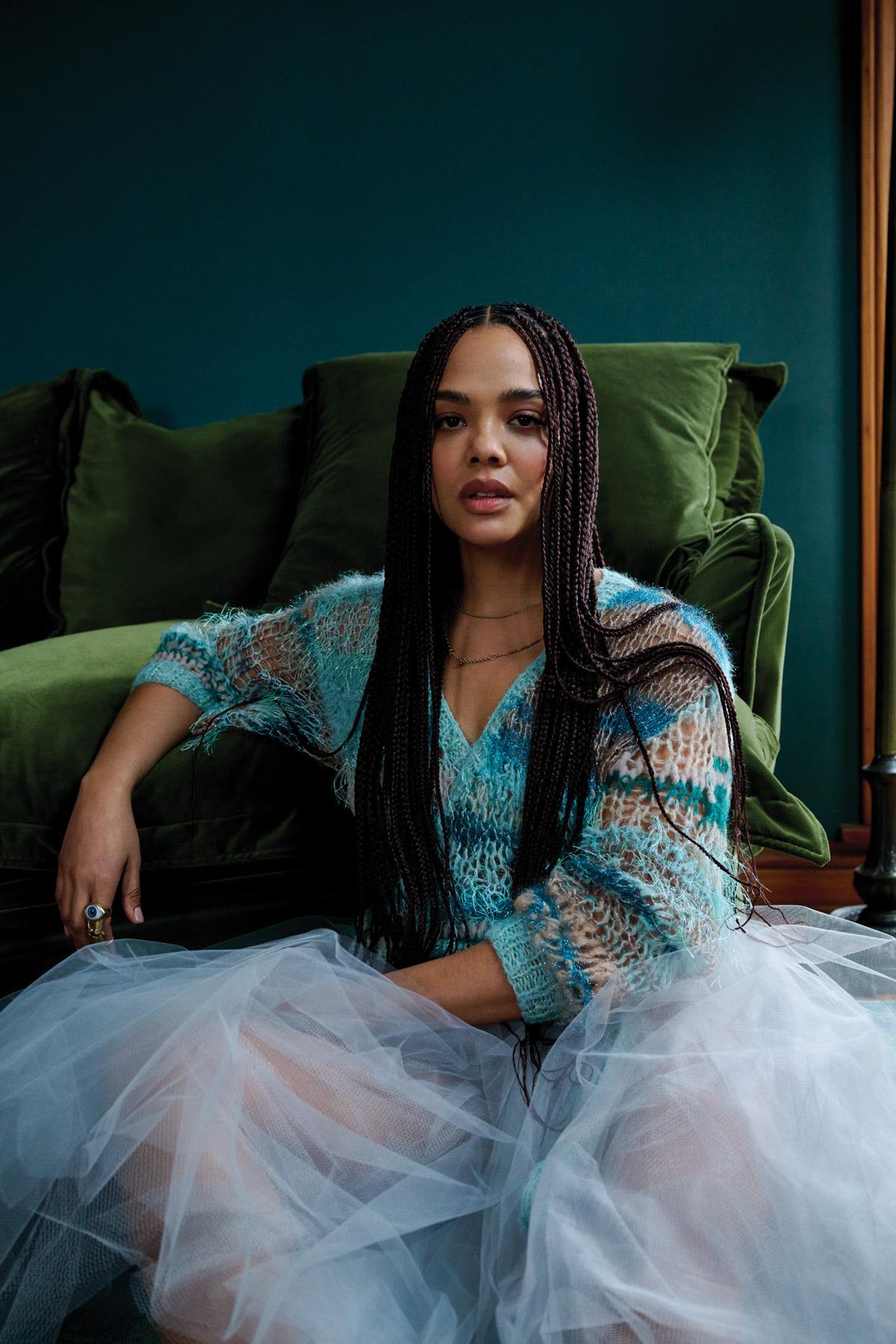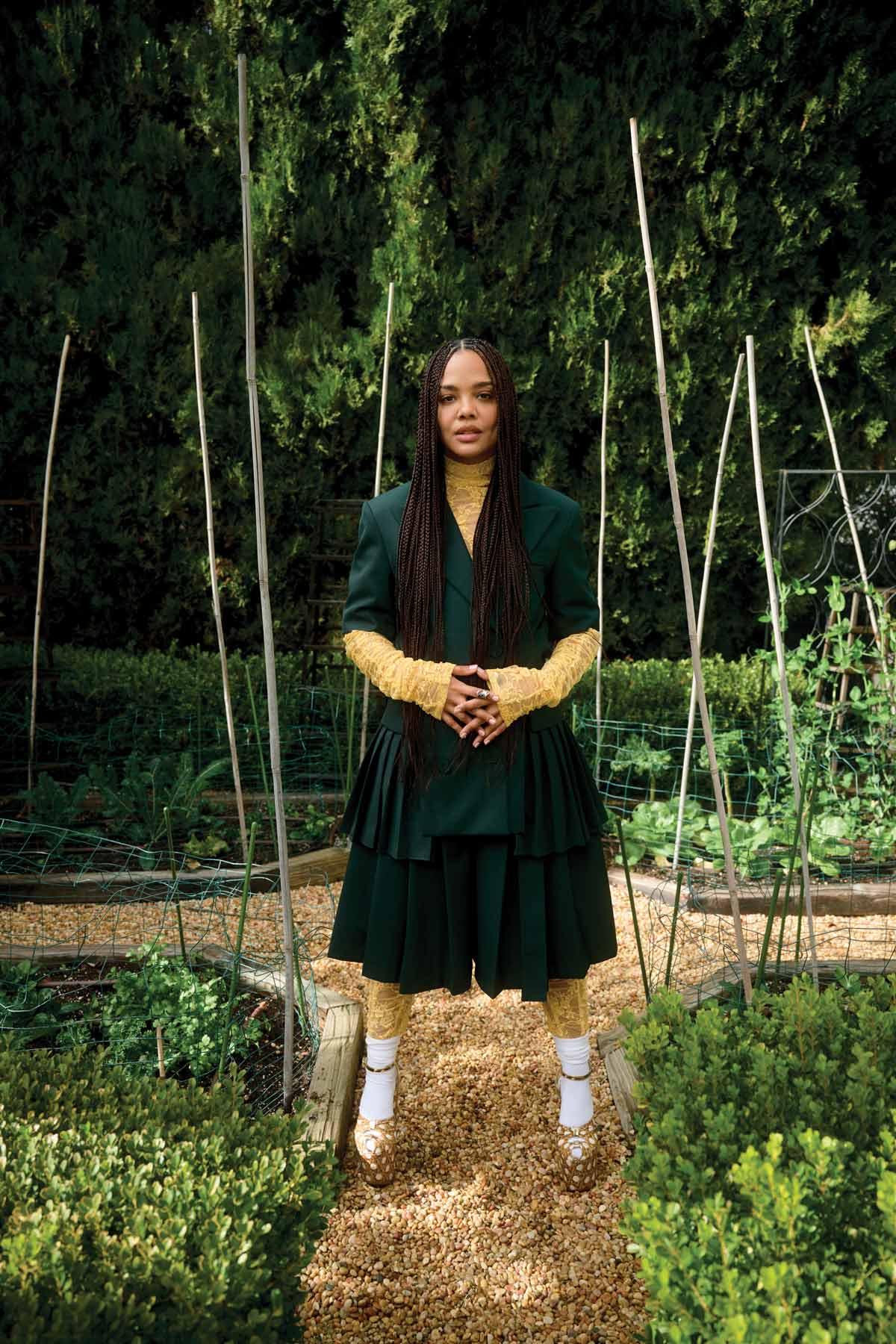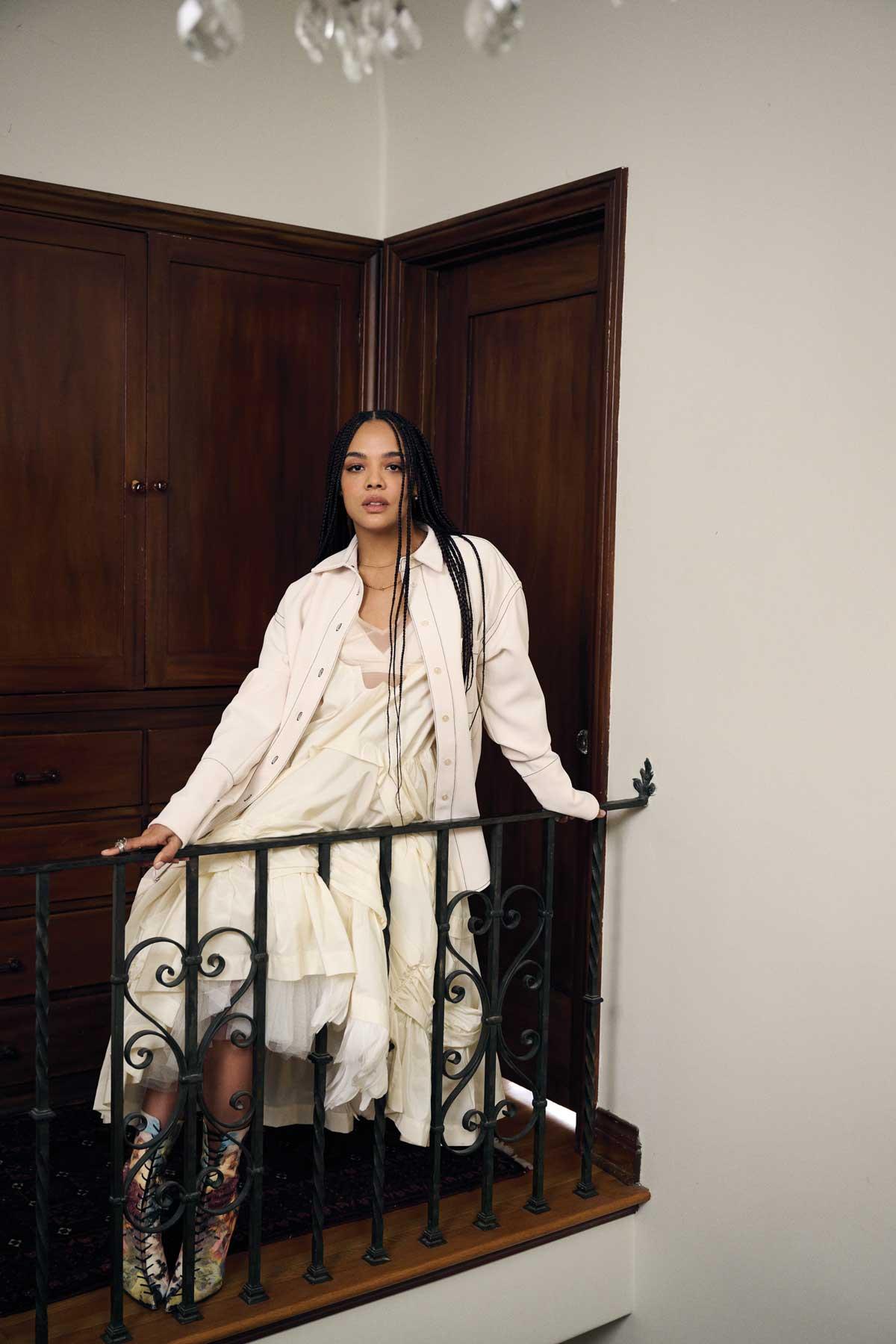Whether she’s co-starring in Creed, making magic in Marvel movies, or lighting up indie gems, Tessa Thompson is always riveting to watch. Here, L.A.’shomegrown heroine gets candid about her sexuality, her new home, and her philosophy that shattering cultural expectations “isn’t political, it’s just delicious”
DEFINING WHAT “HOME” means for herself, and finding homes for underrepresented creative work, are both recurring themes in Tessa Thompson’s life. The 39-year-old actor is literally building a home (her first) in Los Angeles (her hometown). She’s also continuing to establish herself as a producer through her company, Viva Maude Productions, where she’s developing projects by folks who audiences don’t usually see—and stories that affirm through real representation rather than by adhering to the politics of respectability. And now, with her latest big-screen blockbuster, Creed III (out March 3), Thompson is returning to the eight-year-old Rocky-spinoff franchise that helped make her a household name. “It feels like coming home,” she tells me.
When I catch up with Thompson on Zoom, she’s not quite settled into the new digs she shares with her dog, Coltrane. The Internet is a little wonky and there are various people coming in and out—making deliveries and placing things. “It’s still kind of a work in progress,” she says of the home she purchased in the early days of the pandemic but was only recently able to begin fully renovating due to work and waiting for permits. But Thompson—fresh-faced and glowing with her waist-length braids half up in a top knot—doesn’t seem at all stressed about the process. Her vibe is extremely chill. “This home has been such a pleasure to build,” she says. And it’s been more than that. “It’s basically a gut renovation, so every inch of the house is an extension of things that were once ideas in conversations and then suddenly on paper, and then blueprints. I think the past couple of years have been, for me, about creating the architecture, not just for this place that I’m currently in, but of this company that I’m building. It’s been nice to have this outward reminder of what’s possible—that we can have ideas and make things. I’ve always kind of known that, but it’s been crystallized in a way with this process of having this home.”
Building the home of her dreams in Los Angeles is particularly significant to Thompson. Born and raised in the city, she grew up in apartments with her mother and sister and spent her school vacations in New York with her dad and his kids from his second marriage, a sister and brother. (“We’re a deeply blended family, I suppose. For me, it feels quite normal,” she says.) Since taking off in the mid-aughts with the beloved TV shows Veronica Mars (in 2005 and 2006) and Grey’s Anatomy (in 2006), and then with such notable movies as Mississippi Damned (2009), For Colored Girls (2010), and Dear White People (2014), Thompson’s career has sent her all over the world. “Because of my line of work, I’ve been so nomadic,” she explains. “I’m based where the work is, and that changes. It has sometimes served me well to not have a concrete home to miss when I’m away. I’m totally a millennial—this idea of renting someplace and having something that’s yours but also not yours didn’t really bother me.” Over the last couple of years, though, Thompson has spent more time in her hometown than anywhere else, and much of her scattered family is now finding its way to the West Coast as well. “Almost all of my family is in L.A. now,” she says. “It’s the first time in my life where that’s been the case. It’s been really incredible to put down roots in a city that I already feel rooted to and also to get to really build something.”
Thompson, whose father is a musician, grew up destined to be an artist. “Everyone in my family makes something,” she says. As evidence, she holds up a ceramic bowl made by her mother, who also draws and hand-makes jewelry. “When I first started thinking around being a creative person in pursuit of a career—watching my parents, and really everyone in my family—I always thought of it as something you just sort of do. My family feels intensely creative. I was raised with the idea that there’s no one way to do that ‘right’ or ‘successfully.’”

Rodarte Dress and Sweater; Lillian Shalom Ring; Necklaces: Thompson’s Own.

Anonlychild Jacket, Skirt, Leggings, and Top; Giambattista Valli Shoes; Socks: Stylist’s Own
Freedom to create isn’t the only privilege Thompson was afforded by way of her bohemian upbringing. She’s also felt free to be herself in other ways. In 2018, the typically private star shared with multiple media outlets that she is attracted to both men and women. “I hadn’t thought about it as ‘coming out,’” explains Thompson, who’s been romantically linked to Janelle Monáe and left curious tongues wagging when photographed getting close to Taika Waititi and Rita Ora. “It wasn’t a deliberate effort, but there’s something powerful about seeing some part of yourself reflected in the media. In that way, I think the more that we tell our stories, and the less afraid we are to be honest about who we are and who we love, the more we help other people do the same thing. I’m really lucky in the sense that I grew up inside of a community and inside of a family where it’s not been hard for me to do that. But I acknowledge that for so many people, it is really hard, and that’s not to be taken lightly. If being able to talk authentically about who I am helps other people do the same, then I’m grateful for it.”
Although Thompson performed in several school plays, pursuing a career in acting wasn’t a given. “Growing up in Los Angeles, something about proximity to [the industry] made me sort of take the idea for granted and not consider it seriously,” she says of making it in Hollywood. “It makes total sense to me that people come to L.A. from different parts of the world with this dream—and maybe I would have been one of those people had I not grown up in L.A.”
Now Thompson—who, before embarking on her Hollywood career at 22, studied cultural anthropology at Santa Monica College and wondered if there was “more important work” that she might enjoy—seems to have not just found, but also created, the perfect career for herself. Not a stereotypical scene-stealer, Thompson has become known for performances that are often understated—neither boisterous nor loud, but imbued with an ineffable allure that makes it impossible not to focus on her extremely expressive face when she’s on screen. Her diverse résumé includes standout roles as a civil rights hero (Selma, 2014) and a villainous robot (Westworld, 2016 to 2022). And she’s as acclaimed for her work in blockbusters like Marvel’s Thor films (2017 to 2022) as she is for indies like Sorry to Bother You (2018) and Little Woods (2018).
“I want to do things that excite me and scare me and also things that are fun,” says Thompson when asked how she chooses her projects. “I like to take risks, and I feel really varied in terms of my interests. I have seen so many folks in the course of their careers be able to traverse really varied spaces, but I just don’t know if that opportunity has been afforded to talent of color in the same way.”
In Creed III, she returns as Bianca, one of her most beloved characters, the girlfriend-now-wife of the franchise’s titular Adonis Creed, played by her close friend Michael B. Jordan, who makes his directorial debut with this third installment.
“I just love making these movies,” says Thompson. “It always feels like a homecoming. Over the eight years that we’ve been working on this series of films, there’s a familiarity that has been established, particularly between me and Mike. We have such a shorthand. We both have grown so much since the first time around. With Mike at the helm, it was so exciting to see someone I love so much actualize something that’s been a dream—and then see him do it so well.”
Adding to the familial vibe on set is the fact that much of the crew has worked on all three films. “You get to see everyone’s growth,” says Thompson. “Over the years, many of them have had families and there’s something that feels really special and rarefied about that. You typically have that in television, but not so much in the movie-making process.” The third installment also adds Lovecraft Country’s Jonathan Majors, who Thompson calls “a chameleon and fantastic actor,” to the mix as Adonis’ childhood friend-turned-rival. “These movies are, of course, very masculine in that they are about dudes fighting,” says Thompson, “but there’s so much at the heart of the film that is actually unpacking the toxicity of masculinity.”
Along those same lines, as a producer, Thompson says multidimensional characters who defy stereotypes always dominate the stories she wants to tell. “With a project like Passing, for instance, there was this fundamental idea at the core of that film that none of us fit squarely into the boxes that we sometimes try to stuff ourselves inside,” says Thompson of the 2021 film, adapted from the 1929 novel by Nella Larsen, which she both starred in and produced. A story about two Black women friends who lose touch and then reconnect in New York where one of them is pretending to be white, Passing earned Thompson a BAFTA nomination for her performance and a reputation as a producer who is unafraid to tackle challenging material. “It really strikes to the heart of something that I think is doubly true for some of us, depending on our particulars,” she says of that film. “In Hollywood, there are these very small boxes that we have been given to exist inside.”
Since creating her own production company in 2021, Thompson has announced planned adaptations of three more books—Nnedi Okorafor’s Afrofuturist novel Who Fears Death; short story collection and National Book Award finalist The Secret Lives of Church Ladies, by Deesha Philyaw; and Luster, a sexy, yearning novel about a young woman who becomes entangled in an older couple’s marriage. “You know when you read something, or you see something, and it feels like it’s yours? It feels like it’s speaking right to you, personally?” Thompson asks. “But then you have conversations with other people and you realize you’re in this community of people who are thinking and feeling the same way?” Thompson says this is true of Luster, a book notable for its main character, who is both imperfect, and at times, unlikable, a freedom rarely afforded to Black women protagonists. “Luster felt like an important story that should be told, but not in a medicinal way,” explains Thompson. “It’s not political, it’s just delicious.”
If not political, deliciousness on its own can certainly feel liberating. “I want us to be seen, not as a monolith, but for all the things that we can be,” says Thompson about Black representation on screen. “That’s been an aim of mine personally. The altruistic reason is that I want to be able to advocate for my community. And my less altruistic reason is it’s just more interesting and more fun that way. Both reasons—the altruistic one and the less altruistic one—keep me inspired to chart that course. I ask myself a lot, ‘Where have we not been before?’ And that’s not just about Black women, necessarily; it’s thinking around all the pockets of folks who maybe haven’t gotten the opportunity to be seen in really varied ways in media and in popular storytelling, and just thinking, ‘How do we get us there?’”
It seems inevitable that as a natural-born artist, Thompson will expand even further beyond acting and producing as her passions continue to develop. “I’ve been working on an adaptation of my own,” she reveals. “I have thought about writing and directing for a while and I’ve even written stuff that I just never showed anybody because it was more an exercise for myself. I’ve been really waiting for something to strike me—something that I could adapt that felt like I had skin in the game, where there’s something fundamental about myself that I also get to explore in the piece. I’m really excited that I feel like I have found that thing. It’s really been a gift.”
Though she’s mum on specifics, we can expect the work to be consistent with her overarching philosophy: “The thing that has become a real aim in the work that I do,” says Thompson, “in whatever my small contribution is to Hollywood or film iconography—I want to expand the way that a woman like me is perceived.”
 Simone Rocha Dress; Paris Georgia Jacket; Balmain Shoes; Lillian Shalom Ring; Necklaces: Thompson’s Own.
Simone Rocha Dress; Paris Georgia Jacket; Balmain Shoes; Lillian Shalom Ring; Necklaces: Thompson’s Own.
Top Image: COLLINA STRADA DRESS; NECKLACES: THOMPSON’S OWN
BY SABRINA FORD
PHOTOGRAPHED BY Phylicia J. L. Munn
Styling by Wayman + Micah // Makeup by Nina Park
Hair by Lacy Redway // Nails by Zola Ganzorigt


